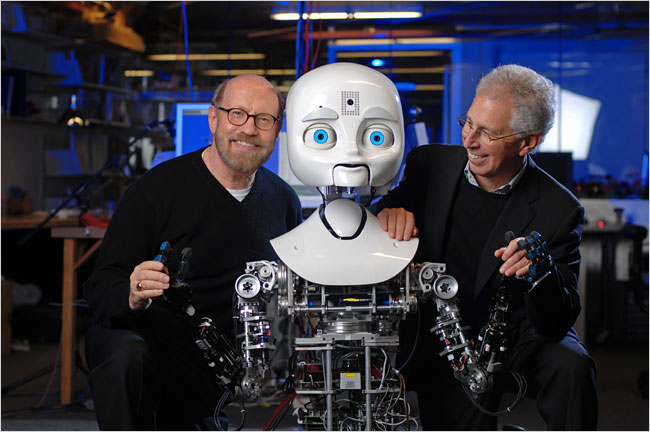
Film Narrative in Center for Future Storytelling," by Michael Cieply.
Here’s the first paragraph:
LOS ANGELES — The movie world has been fretting for years about the
collapse of stardom. Now there are growing fears that another chunk of
film architecture is looking wobbly: the story.
From
the get-go, I lose almost all trust in this writer and become worried
about the direction in which this seems to be headed. Is this actually
about film narrative, or is it another stupid story about how digital
actors will replace our brangelinas and tomkats? I find the assertion
that "stardom" is a "chunk of film architecture" more than a little
appalling. I thought this story was about M.I.T.’s Media Lab? So I
googled the initiative, and found a press release on the Media Lab’s
website. Here’s what they actually want to do:
(…) [T]o revolutionize how we tell our stories, from major motion
pictures to peer-to-peer multimedia sharing. By applying leading-edge
technologies to make stories more interactive, improvisational, and
social, researchers will seek to transform audiences into active
participants in the storytelling process, bridging the real and virtual
worlds, and allowing everyone to make their own unique stories with
user-generated content on the Web. Center research will also focus on
ways to revolutionize imaging and display technologies, including
developing next-generation cameras and programmable studios, making
movie production more versatile and economic.
“Storytelling is at the very root of what makes us uniquely human,”
said Frank Moss, Media Lab director and holder of the Jerome Wiesner
Professorship of Media Arts and Sciences. “It is how we share our
experiences, learn from our past, and imagine our future. But how we tell our stories depends on another uniquely human characteristic–our ability to invent and harness technology.
The NYT article constantly harps on how big movies like "The Graduate"
just aren’t possible anymore because who can compete with the flash of
something like "Transformers" and completely misses the point and
mischaracterises M.I.T.’s primarily technological investigations. I can
understand the need to have a hook, or an angle for a story, but
twisting something this much is just gross. It’s even more disturbing
considering how easy it would be to give this a techy bent and include
it in that section, instead of getting a quote from the Farrelly
brothers and sticking this in the Arts section. I tend to expect a
little more class from the New York Times…
But the worst slap for me is the implication that we need M.I.T. to
experiment with narrative. Artists have been playing around with the
darned thing for Centuries, and in the context of filmmaking, before
anything remotely like "Hollywood" was invented. From James sibley
Watson and Melville Weber’s "The Fall Of The House Of Usher" (1928)
to Maya Derren’s "Ritual in Transfigured Time" (1946) to Jack Smith’s
"Flaming Creatures" (1962) to Tony Oursler’s
"Sucker" (1987) or Ryan
Trecartin’s "I-Be Area" (2007) or thousands upon
thousands more artists working in experimental/avant-garde mode in
moving images to expand the possibilities of narrative beyond the
classical structures of the time, the intimation that we need the
M.I.T. Media Lab to step in and fix things is ludicrous and insulting.
It feels like getting turds dropped on you from Saruman’s Ivory Tower:
it stinks, it’s insulting and it’s evil.
Having gone beyond the fluff piece NYT tried to shove down my throat,
and having read the actual press release from M.I.T. Media Labs, I
think that I am excited to see what they develop, though I am concerned
that, like good orcs, their developments in storytelling technologies
will only be put to use for commercial/evil purposes and that artists,
who have proven to be historically more capable of expanding the
possibilities of any given medium beyond what any commercial initiative
has been able to, will not be alowed to play with the shiny new toys.
Hey Media Labs, can we get a residency program at the Center for Future
Storytelling?



